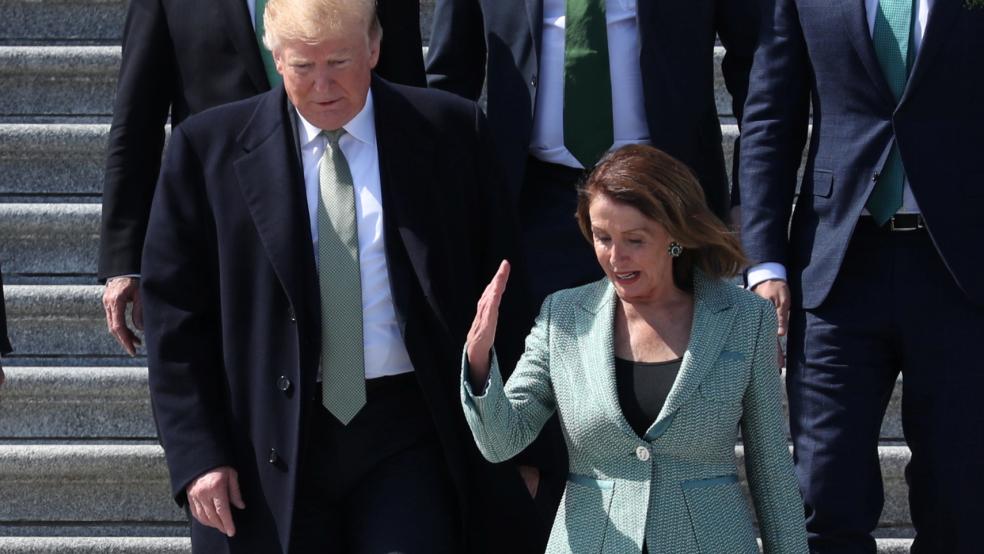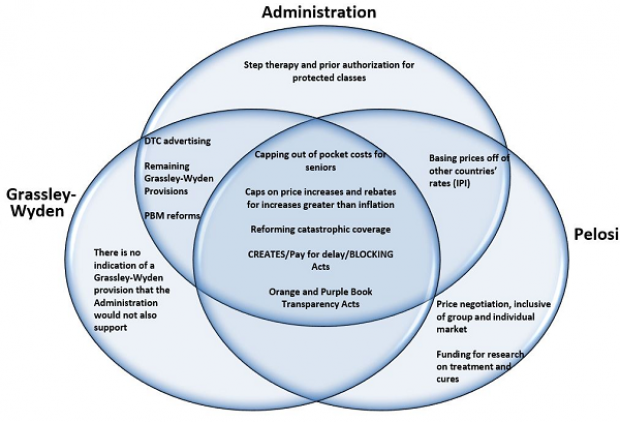Many Republicans were quick to criticize House Speaker Nancy Pelosi’s new proposal to reduce drug prices. President Trump wasn’t one of them. Soon after the California Democrat released her drug-price bill Thursday, Trump said in a tweet that it was “great to see Speaker Pelosi’s bill.”
While also saying he liked a competing bill from Sen. Chuck Grassley, Trump called on lawmakers to act now to bring down drug prices: “Let’s get it done in a bipartisan way!,” the president tweeted.
Trump’s comments are a reminder that he has promised to lower drug prices and appears to be highly motivated to make a deal that he could trumpet on the campaign trail in 2020. But there are still lots of hurdles along the path to making that deal, not least from inside his own party.
Conservatives say they fear a government takeover: Republican critics of the Pelosi proposal dismissed it out of hand. Echoing Senate Majority Leader Mitch McConnell’s pronouncement that the Democratic plan was essentially dead on arrival, Sen. John Cornyn condemned it as mere posturing: “The speaker's plan is just the latest example of a partisan messaging document masquerading as legislation,” Cornyn said on the Senate floor, “and it has absolutely no chance — zero, zip, nada — no chance of passing the Senate or becoming law.”
Activists on the right were also highly critical, with the arch-conservative Institute for Policy Innovation ominously warning that Pelosi’s plan was the “most radical government takeover of the health care system yet.” Ryan Ellis of the Center for a Free Economy compared the tax penalties in Pelosi’s proposal to a “Venezuelan-style socialist takeover of the bulk of the prescription drug industry.”
Some progressives aren’t happy, either: Pelosi’s bill also received criticism from the left. Disappointed by the proposal’s call for a minimum of just 25 drug prices to be negotiated each year, some progressive Democrats are pushing for a more aggressive approach that would mandate negotiations on 250 drugs a year.
If Republicans are going to slam the proposal as a messaging effort, liberals say Pelosi might as well push a stronger message. David Dayen of The American Prospect called the proposal “pre-compromised mush” and complained that the bill ignores one of the most important causes of high drug prices: the patent system. “The bill does nothing to break the cycle of giving exclusive patent monopolies to pharma companies,” Dayen wrote Thursday, adding that drug companies would likely find and exploit loopholes in the rules with ease.
But there may be room to make a deal: Pelosi’s plan embraces one basic element of the Trump administration’s blueprint to lower prescription drug costs — in fact, the only key element that hasn’t been scrapped or blocked by courts: pegging U.S. prices to an index of prices in other developed countries. And, as NPR notes, in announcing her plan, Pelosi used language very similar to that used by Trump recently: "It stops drug companies from ripping off Americans while charging other countries less for the drug," the speaker told reporters this week.
An analysis of the three leading drug price plans — Pelosi’s, Grassley’s and an earlier proposal from the Trump administration — by McDermott Consulting found that there is considerable overlap among them, including capping costs for seniors and limiting price increases to the rate of inflation. Here’s the Venn diagram from the report:
“Based on the above Venn diagram, it is totally plausible that a prescription drug pricing package could come together,” the McDermott analysts wrote. “The policy overlap for a significant package is clearly there.”
Though it may not be enough: Trump’s motivation combined with some degree of real agreement on policy issues suggest that lawmakers could find a way to craft legislation aimed at controlling drug prices. But there are still plenty of reasons to think the effort will go nowhere. For one thing, Pelosi said this week that she will not back down from her call to empower the government to negotiate drug prices — a provision firmly rejected by Senate Republicans. Pelosi’s call for the use of an index based on foreign prices to determine prices in the U.S. — which the White House has embraced previously — is also clearly unacceptable to Senate Republicans, who say it amounts to embracing foreign price controls.
In the end, the odds are that Republicans will stick to their fundamental economic principles, which, as The Los Angeles Times’ Jon Healey points out, nicely coincide with the interests of Big Pharma. “So despite the unusual degree of agreement across partisan lines and across the two chambers of Congress,” Healey wrote Friday, “the idea of putting a ceiling on prescription drug price increases looks like a long shot.”





